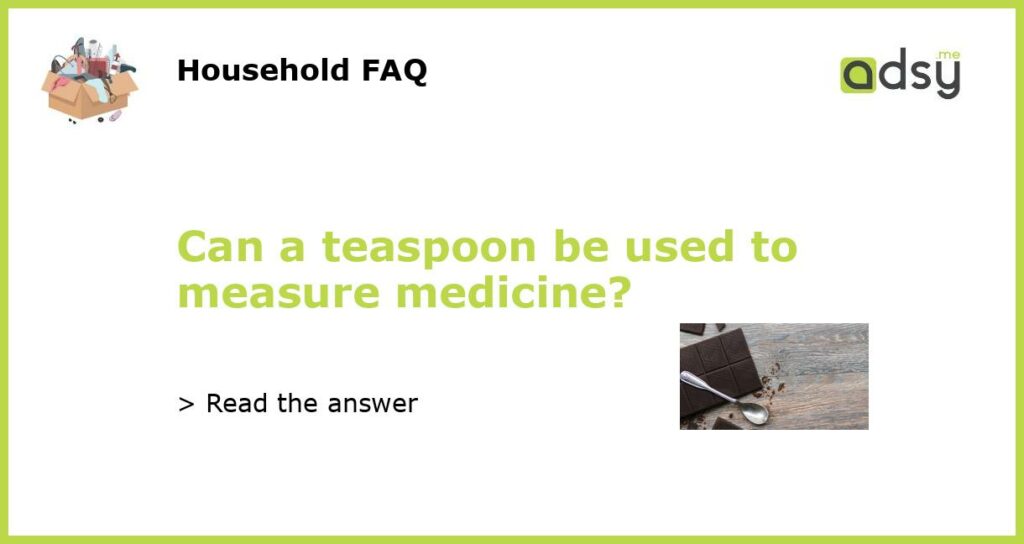Yes, a teaspoon can be used to measure medicine, but it may not be the most accurate method.
When it comes to measuring medicine, especially liquid medication, precision is key. Using the correct dosage is important for the effectiveness and safety of the medication. While a teaspoon can be a convenient household item to use for measuring medicine, it may not provide the most accurate measurements.
Why you might consider using a teaspoon
A teaspoon is a common household item that many people have readily available in their kitchen. It is a convenient option for measuring small amounts of liquid medicine, particularly when an accurate measurement is not critical. For example, if you are taking a daily vitamin or a nonprescription liquid medication where a slightly higher or lower dose may not have a significant impact, using a teaspoon is usually acceptable.
Potential inaccuracies of using a teaspoon
While using a teaspoon may be convenient, there are a few reasons why it may not provide the most accurate measurement for medicine:
1. Varying spoon sizes: Teaspoons can vary in size, and different regions may have different standards for what constitutes a teaspoon. In some cases, a teaspoon may hold slightly more or slightly less liquid than the desired dosage. This variability can lead to inconsistent dosing and potential risks or reduced effectiveness.
2. Difficulty in measuring precise amounts: Measuring liquid medicine accurately using a teaspoon can be challenging, especially for medications that require specific doses. The meniscus, or curve, of the liquid in the spoon can make it difficult to determine the exact level of the medication. This can lead to under or overdosing.
3. Safety concerns for high-risk medications: Certain medications, such as those with a narrow therapeutic range or high toxicity, require precise dosing to maximize effectiveness and minimize side effects. Using a teaspoon for these medications can increase the risk of dosing errors, potentially leading to adverse health effects.
Alternatives for measuring medicine accurately
While a teaspoon can be used as a rough estimate for measuring medicine, there are more accurate alternatives available:
1. Medicine syringes: Medicine syringes are commonly used in hospitals and pharmacies to measure liquid medication accurately. They have clear markings that allow for precise measurement in milliliters (mL) or cubic centimeters (cc). Medicine syringes are especially useful when measuring small amounts of liquid medication.
2. Oral medication droppers: Oral medication droppers are another tool commonly used for measuring liquid medicine accurately. They typically come with clear markings that allow for precise measurements, similar to medicine syringes. These droppers can be useful for medications that need to be administered in drop form.
3. Measuring cups or spoons: In some cases, using measuring cups or spoons specifically designed for medicine measurement may be a more accurate option. These measuring tools often come with clear markings and precise measurements to ensure accurate dosing.
Tips for accurate medicine measurement
Regardless of the tool you use to measure liquid medicine, it is important to follow these tips to ensure accurate dosing:
1. Read the directions: Always read and follow the instructions provided with the medication. The packaging or accompanying leaflet will usually specify the recommended dosage and how to measure it accurately.
2. Use the right tool: When possible, use a tool specifically designed for measuring medicine, such as a medicine syringe or oral medication dropper. These tools are designed to provide accurate measurements.
3. Measure at eye level: When measuring liquid medicine, make sure you are at eye level with the markings on the measuring tool. This helps ensure you are reading the measurement accurately.
4. Ask a healthcare professional: If you have any doubts or concerns about measuring your medicine accurately, consult a healthcare professional. They can provide guidance and potentially offer alternative dosing methods.
In conclusion, while a teaspoon can be used to measure medicine, it may not be the most accurate method. Variances in spoon size and difficulty in measuring precise amounts can lead to inconsistent dosing and potential risks. It is recommended to use more accurate alternatives such as medicine syringes, oral medication droppers, or specially designed measuring tools for medicine. Always read the directions and consult a healthcare professional if you have any concerns about accurately measuring your medicine.






